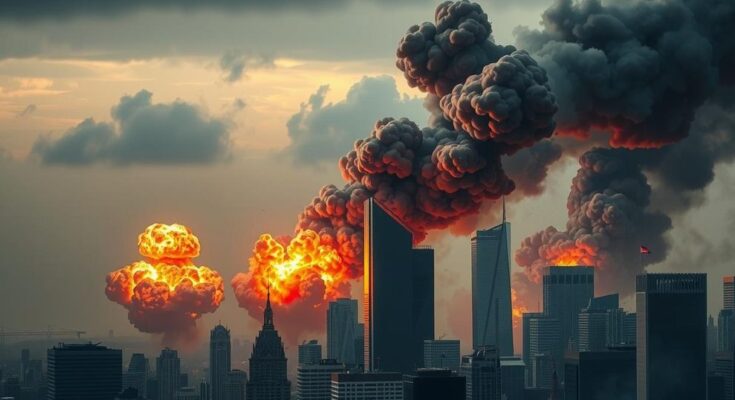Israeli Prime Minister Benjamin Netanyahu has announced an intensification of military strikes against Iran amid ongoing conflict. Recent attacks have targeted Iranian military leaders and infrastructure, while Tehran has responded with missile strikes on Israel. US President Trump has supported Israel’s actions and warned Iran of further consequences. Casualties are rising on both sides, and tensions are high as diplomatic talks have collapsed.
Israel has intensified its military actions against Iran, launching airstrikes for a second consecutive day, as Prime Minister Benjamin Netanyahu signaled that more are on the way. Following a surprise attack that eliminated key figures in Iran’s military structure, Israeli forces reportedly targeted the country’s oil and gas industry. Iranian state outlets detailed the sudden blaze at a gas field, marking the first instance of strikes extending to Iran’s energy resources.
Netanyahu asserted that these military actions have potentially delayed Iran’s nuclear ambitions by years, dismissing international calls for restraint. “We will hit every site and every target of the Ayatollahs’ regime,” he announced in a video message, ominously warning of greater retaliation to come.
In the aftermath, Iranian officials indicated that the strikes resulted in the deaths of approximately 60 individuals, including 29 children, following an aerial bombardment of a housing complex. Reports indicated that Israel had targeted more than 150 sites throughout the attacks. Iran responded with its own missile strikes late Friday, resulting in the death of at least three individuals in Israel. Air raid sirens prompted widespread sheltering in anticipation of incoming threats.
US President Donald Trump has praised Israel’s military operations while cautioning Iran about potential escalation. He suggested that Tehran could curb the Israeli offensive by agreeing to significantly reduce its nuclear program in anticipated discussions with Washington, which have now been canceled according to Oman. Iranian Foreign Minister Abbas Araqchi criticized the talks as unacceptable amid ongoing Israeli attacks.
The latest Israeli strikes included a significant hit on Iran’s energy infrastructure, particularly targeting the South Pars gas field. Iranian media reported that production had been disrupted following the bombings, instigating a rise in crude oil prices by about 7 percent due to fears of regional export interruptions. An Iranian general hinted at the possibility of closing the Strait of Hormuz, a critical gateway for oil tankers.
Amid the turbulence, Israel has urged the Iranian populace to resist their ruling clerics, heightening fears of escalating conflicts involving other nations. Israeli Defense Minister Israel Katz warned, “If Khamenei continues to fire missiles at the Israeli home front, Tehran will burn.”
Tensions continue to mount, as Iran retaliated with a barrage of ballistic missiles and drones, resulting in casualties and injuries across Israel. Residents of Tel Aviv, on edge after a night of air raid sirens, expressed their concerns about further attacks. “We’re still trying to anticipate what will happen this evening,” said local resident Jordan Falkenstein.
In Iran, the massive airstrikes have led to severe destruction of civilian areas, with reports indicating that Israel has left behind significant collateral damage. Iranian authorities reported numerous fatalities, including the tragic loss of families and children, as apartments collapsed due to the bombings.
Israeli officials view Iran’s nuclear endeavors as a dire threat, claiming that military actions aim to impede any progress toward developing nuclear arms. Despite Israel’s assaults reportedly damaging infrastructure at key sites like Natanz and Isfahan, an official mentioned that Fordow, a fortified enrichment site, has not yet been targeted. Tehran maintains that its nuclear initiative is peaceful and denies pursuing atomic weapons, even as international scrutiny intensifies.
As military tensions escalate between Israel and Iran, the potential for further conflict looms large. While Israel claims to have severely disrupted Iran’s nuclear capabilities through strategic strikes, the Iranian response has involved significant retaliation. The situation remains volatile as US involvement may also shift depending on diplomatic efforts, which have recently been derailed. Both nations appear poised for an extended conflict, with rising casualties on both sides and widespread concern for regional stability.
Original Source: www.euractiv.com




